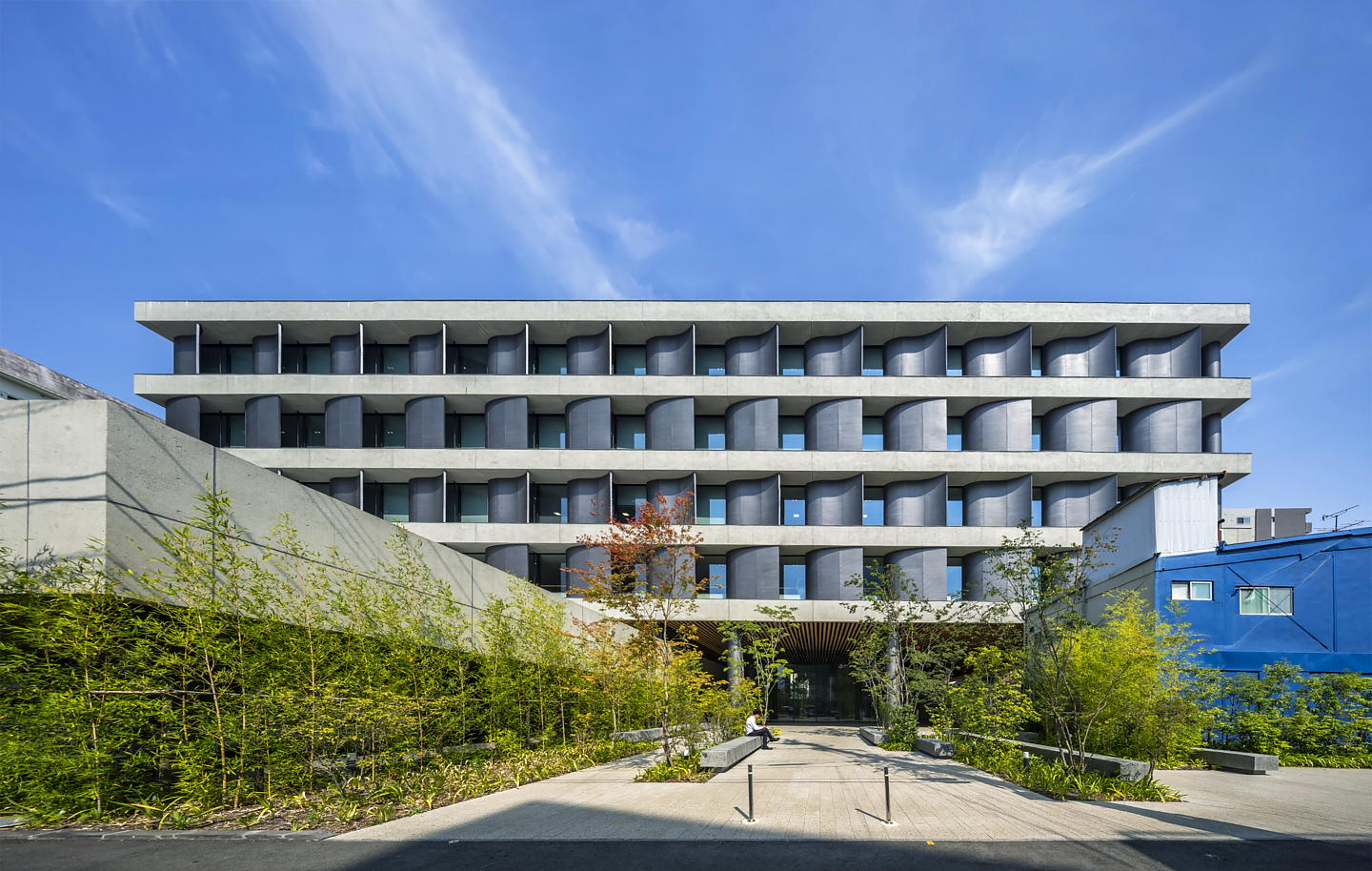
设计单位 日建设计
项目地点 日本熊本
建成时间 2019年
建筑面积 10,143.10平方米
本文文字由设计单位提供。
当建筑成为遗产
SDK熊本大厦是一座租赁式办公楼,其办公环境不仅方便舒适,在此还可以眺望到代表日本中世纪名城的熊本城。这里原是九州历史悠久的ICT企业“西部电气工业”的总部,总部从熊本迁至福冈后,于原址上建设了SDK熊本大厦。
SDK Kumamoto Building offers tenants a convenient, comfortable work environment, as well as a splendid view of Kumamoto Joh, one of Japan's most famous medieval castles. The building was constructed on the site formerly occupied by Seibu Electric Industry, a long-established ICT Kyushu firm, which relocated to Fukuoka.
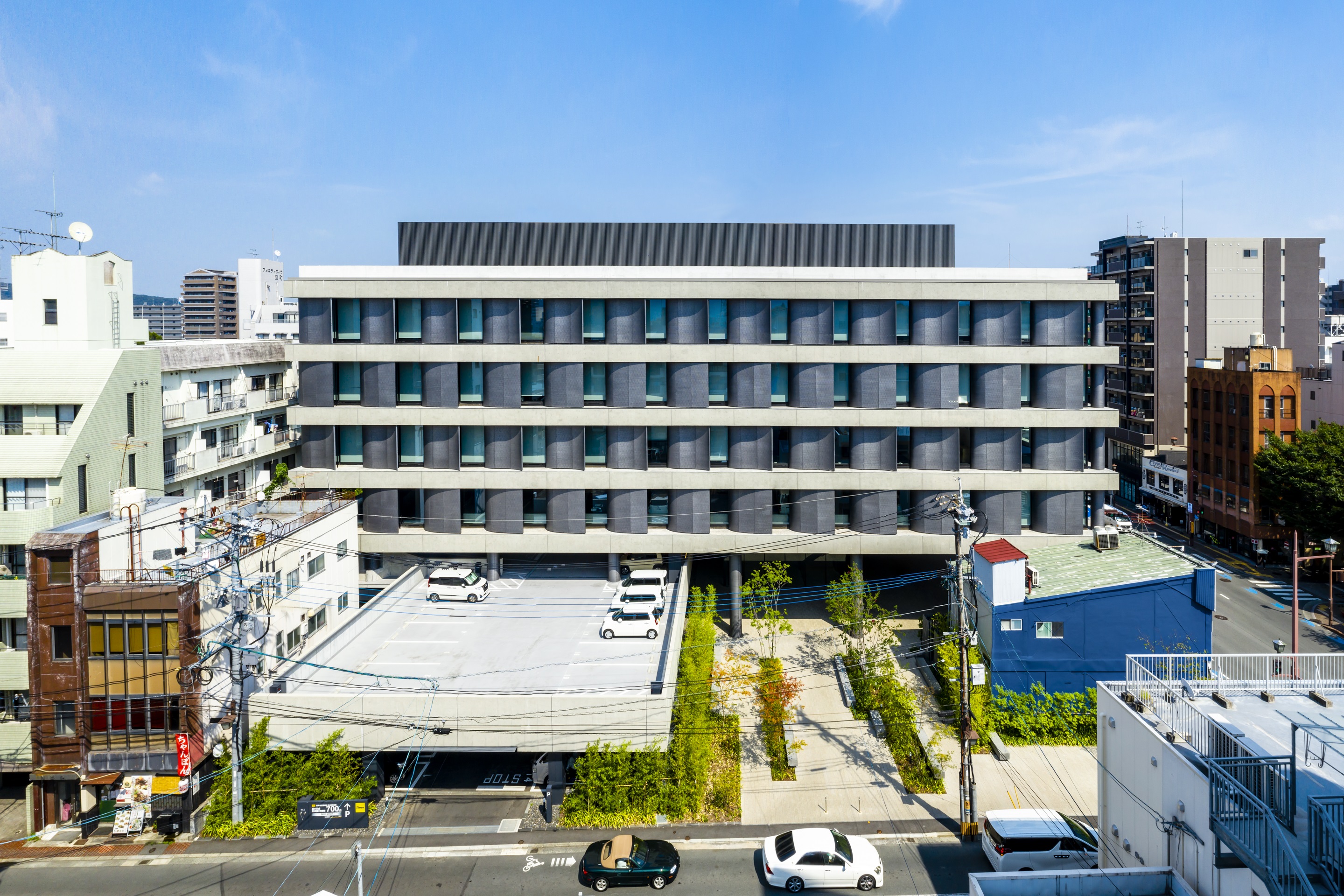
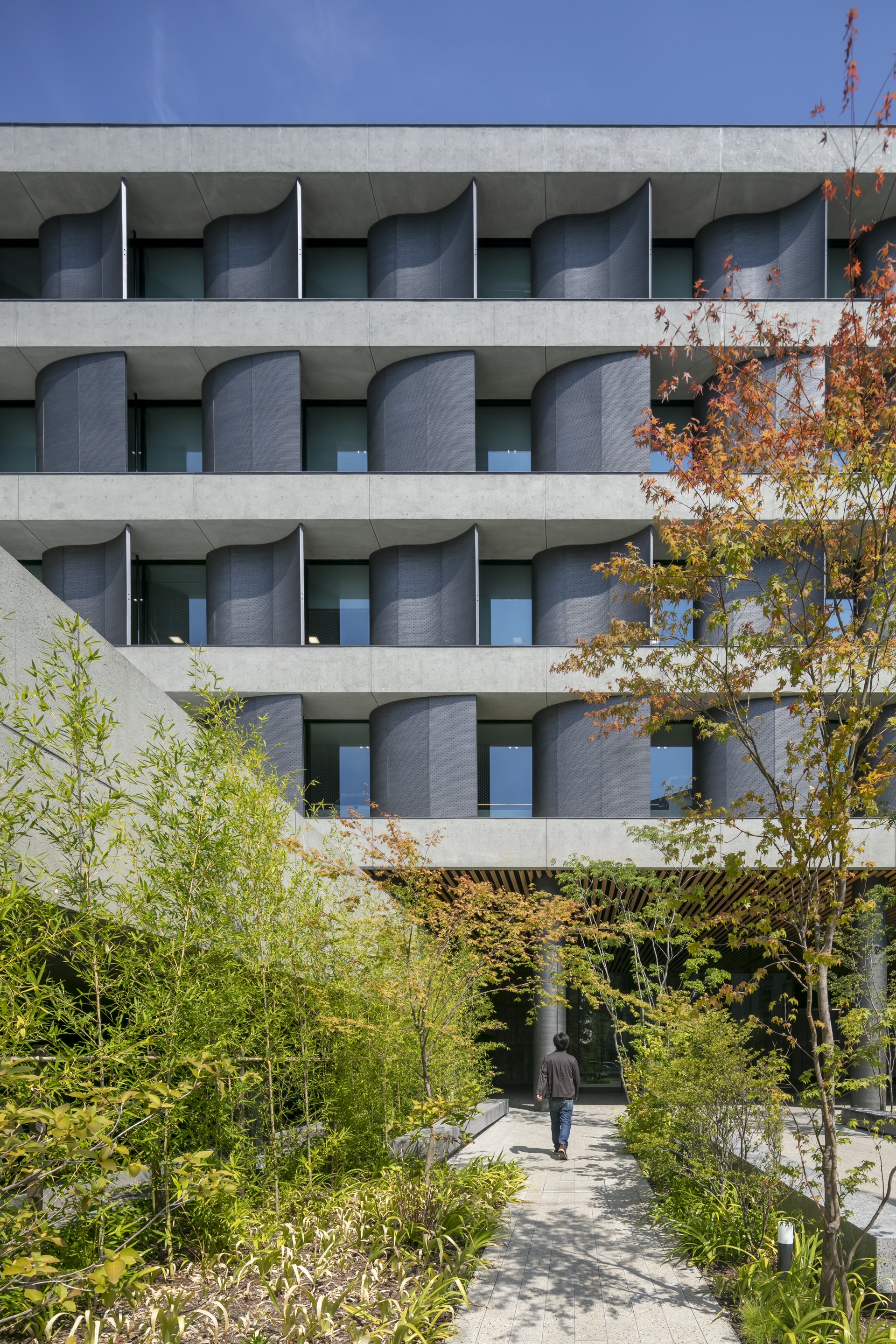
业主希望该项目能体现出“创造区域繁荣活力的社会贡献型城市建设”的理念。我们认为,本建筑在成为该地区不可或缺的存在的同时,还应成为被更多人持续使用的收益性不动产,并通过二者间的平衡为地区做出长期持续的贡献。这一理念不仅是项目成功的有力支撑,还明确了建筑的理想状态。
The owner's philosophy for this project: contribute to the local community by emphasizing vitality. To do this, the building needed to become an indispensable part of the neighborhood, but also profitable by garnering consistent patronage.
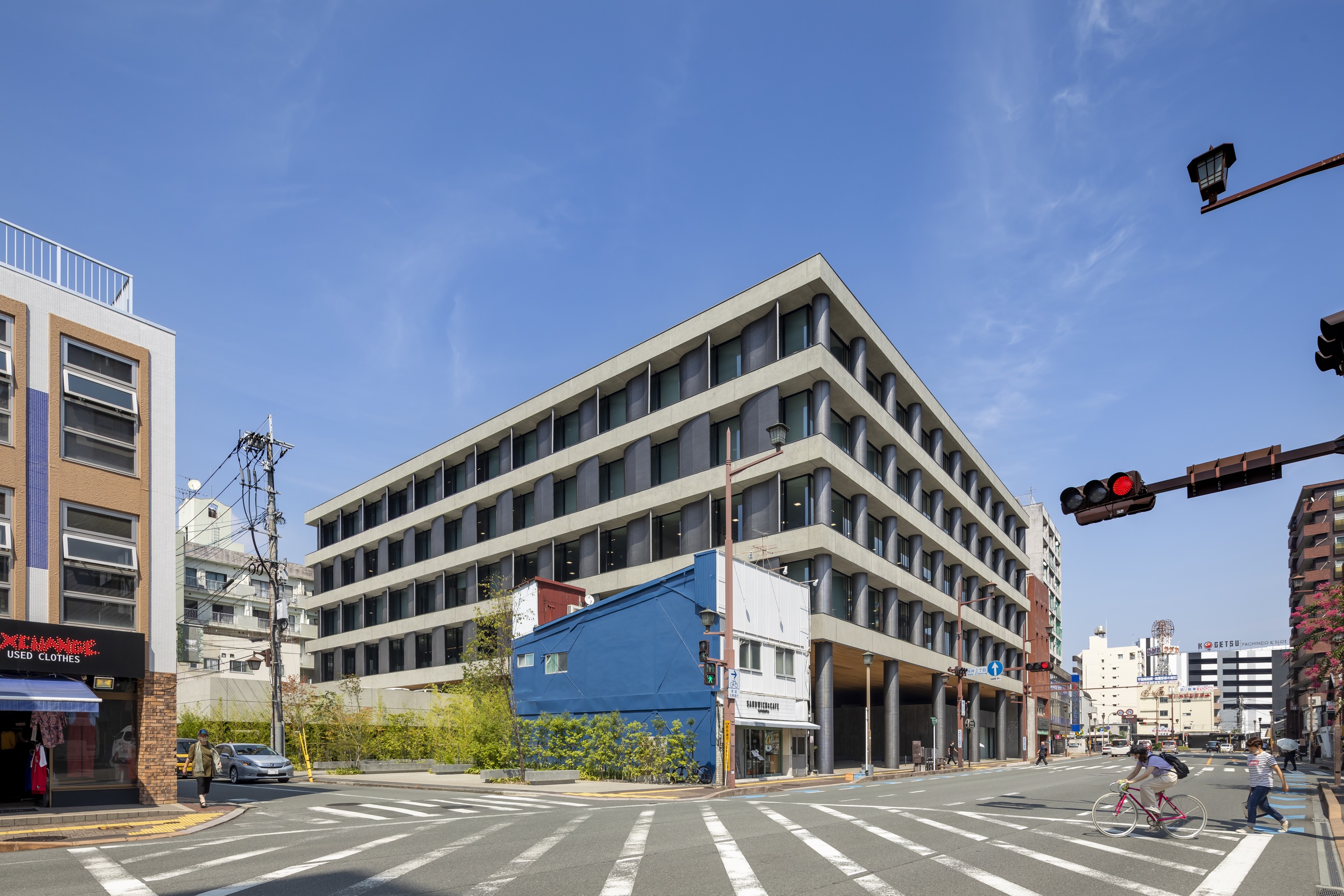
具有熊本特色的办公建筑
由于熊本日照强烈,如何遮阳防晒是本项目的重点之一。针对南面和西面的租户区域,在确保开放感的前提下,我们针对不同方位采用了不同的遮阳措施。
Sunlight is intense in Kumamoto, therefore appropriate countermeasures were one of the most important points of this project. These were tailored to meet tenant needs in areas located on the south and west sides of the building, where a sense of openness can also be ensured.
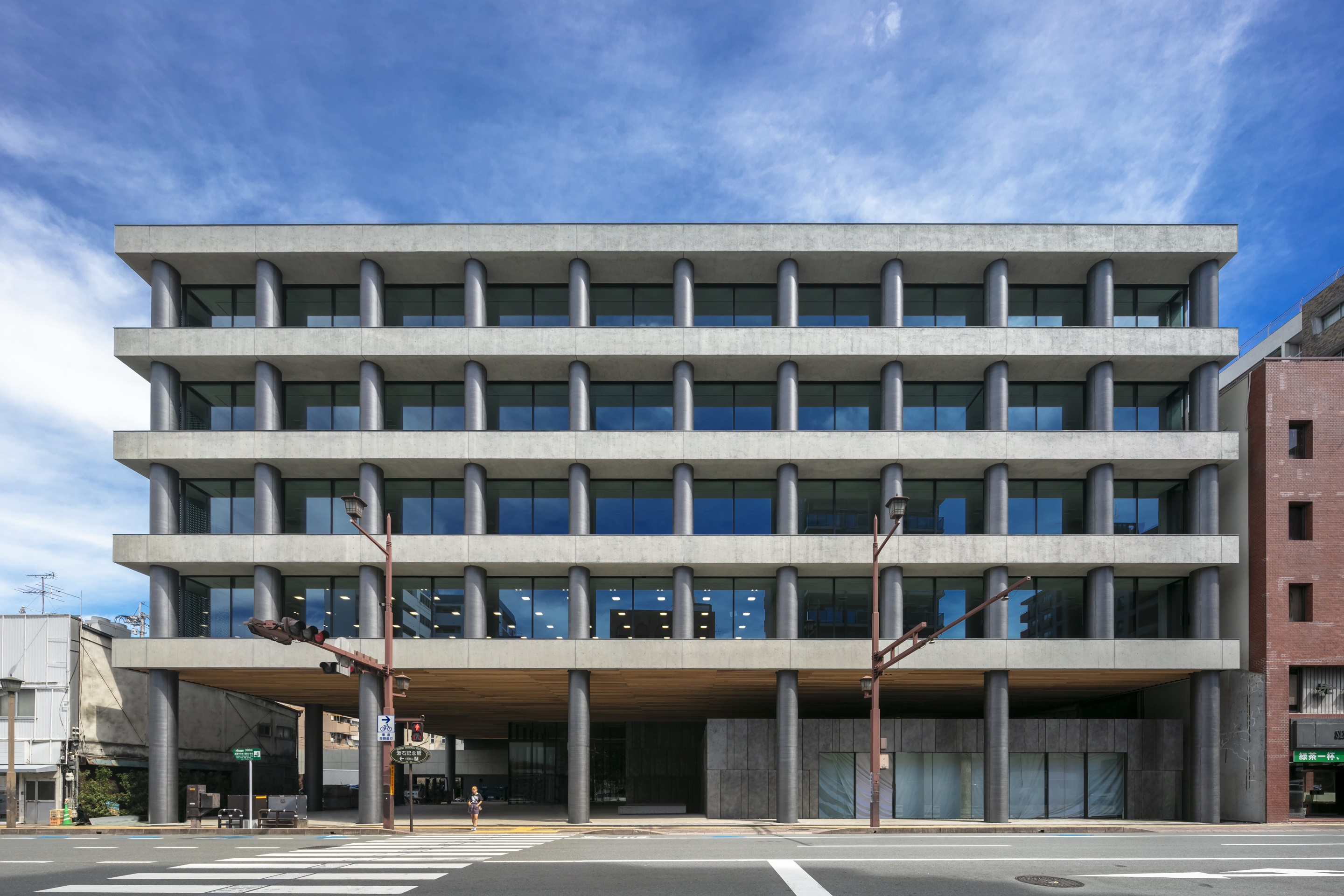

南面屋檐的深度设计,避免了夏天14点到16点间阳光照入室内的直射光。可以眺望熊本城的建筑西面,我们通过BIM模拟研究了开放感、热负荷和窗面亮度之间的平衡。于视窗玻璃外侧设置倾斜的遮光板,能在确保视野的同时降低建筑的热负荷。
For example, the south side eaves depth is set to prevent direct sunlight from entering the building from 2pm to 4pm in the summer. For the west side, which features the Kumamoto Castle view, BIM simulation was employed to achieve a balance between a sense of freedom, heat load, and window surface luminosity. Diagonal shading panels were fitted to the outside of the vision glass to reduce the solar heat load while preserving the unobstructed view.

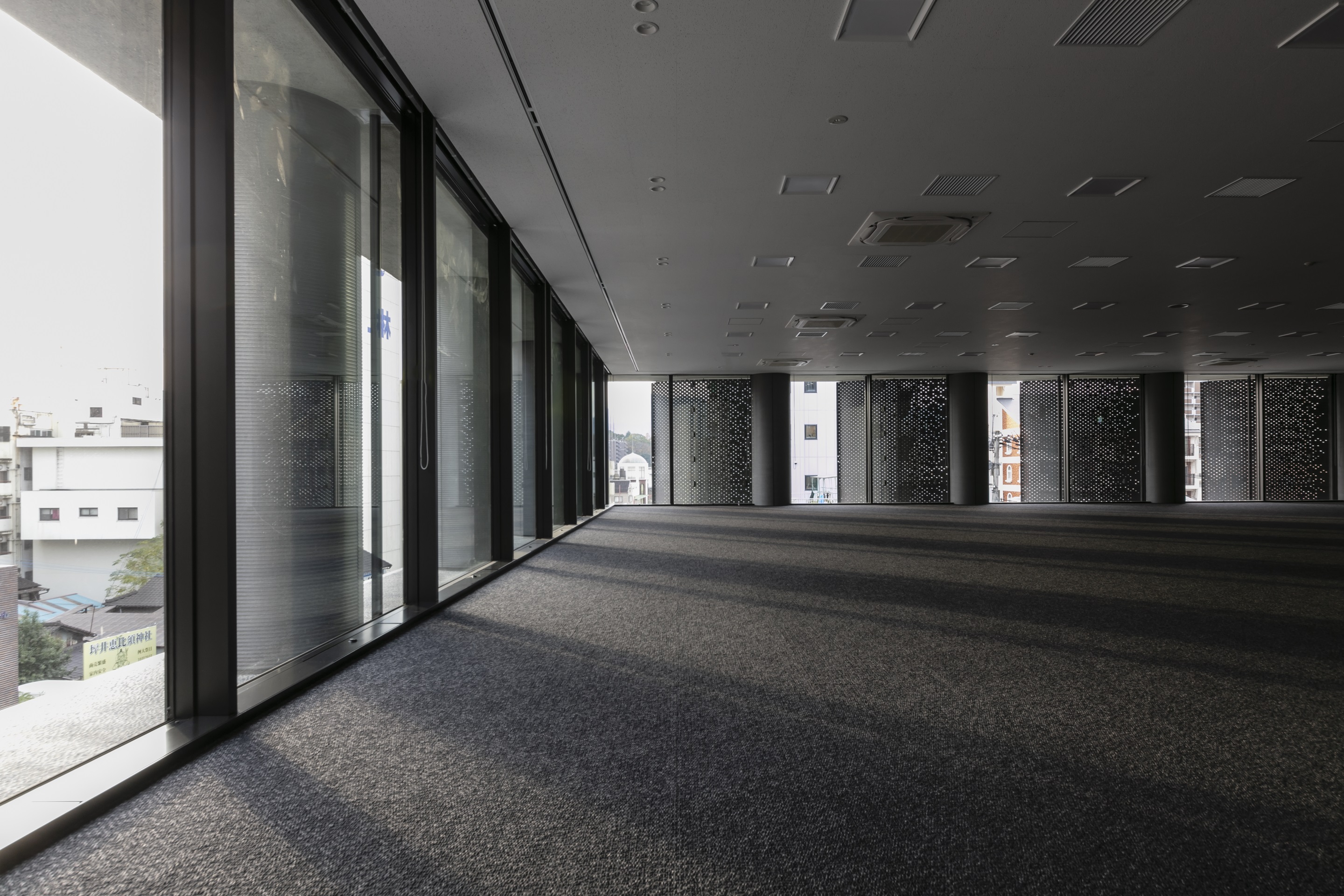
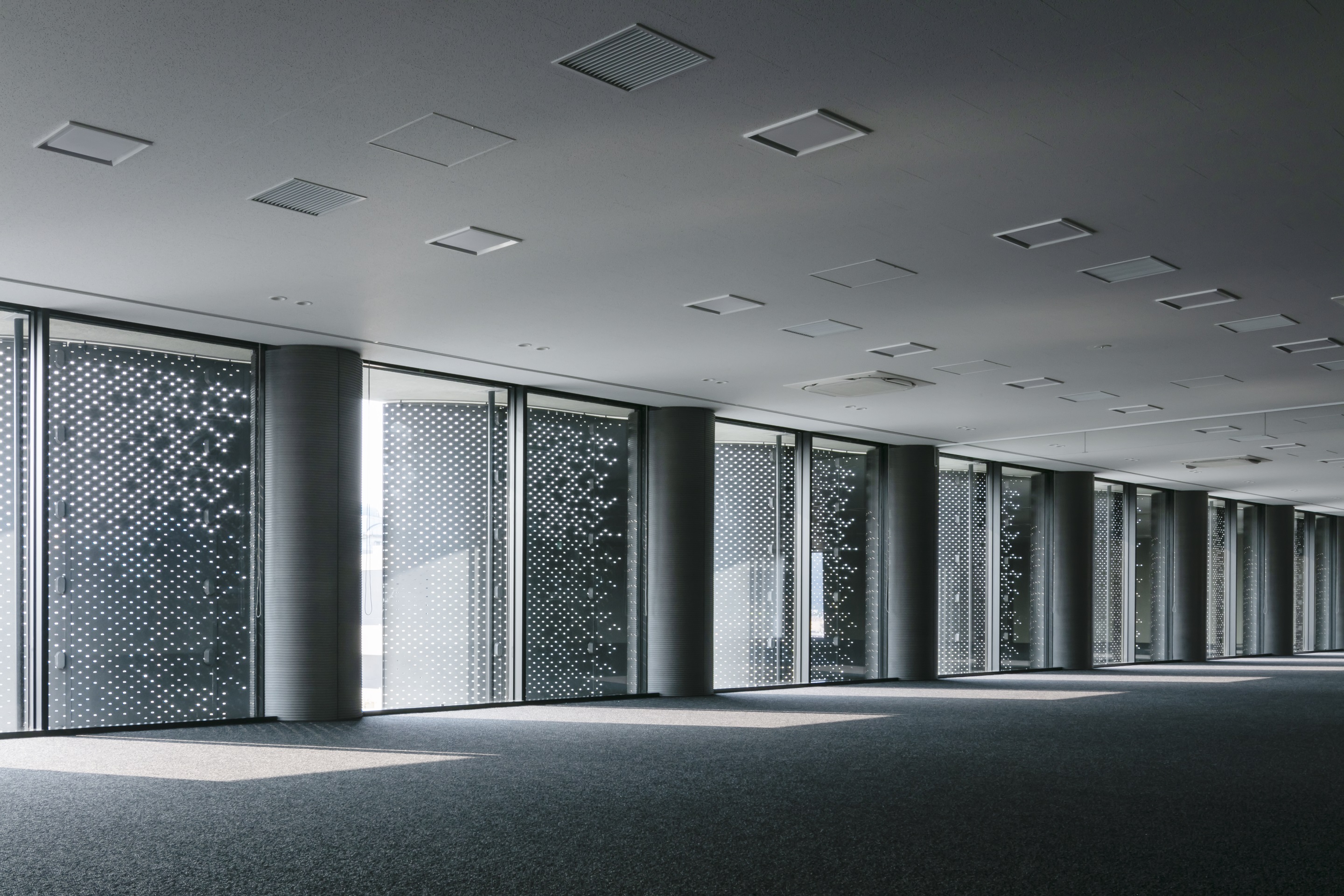
此外,为了在确保亮度的同时抑制热负荷,我们利用细微的凹凸制造出阴影,并在阴影中采用多孔质曲面遮光板,这些带有小孔的板材与可达到同等亮度的普通外装相比,能减少约40%的直射阳光。
Porous curved shading panels with small holes were also deployed on the exterior to reduce direct sunlight by 40% while maintaining brightness.
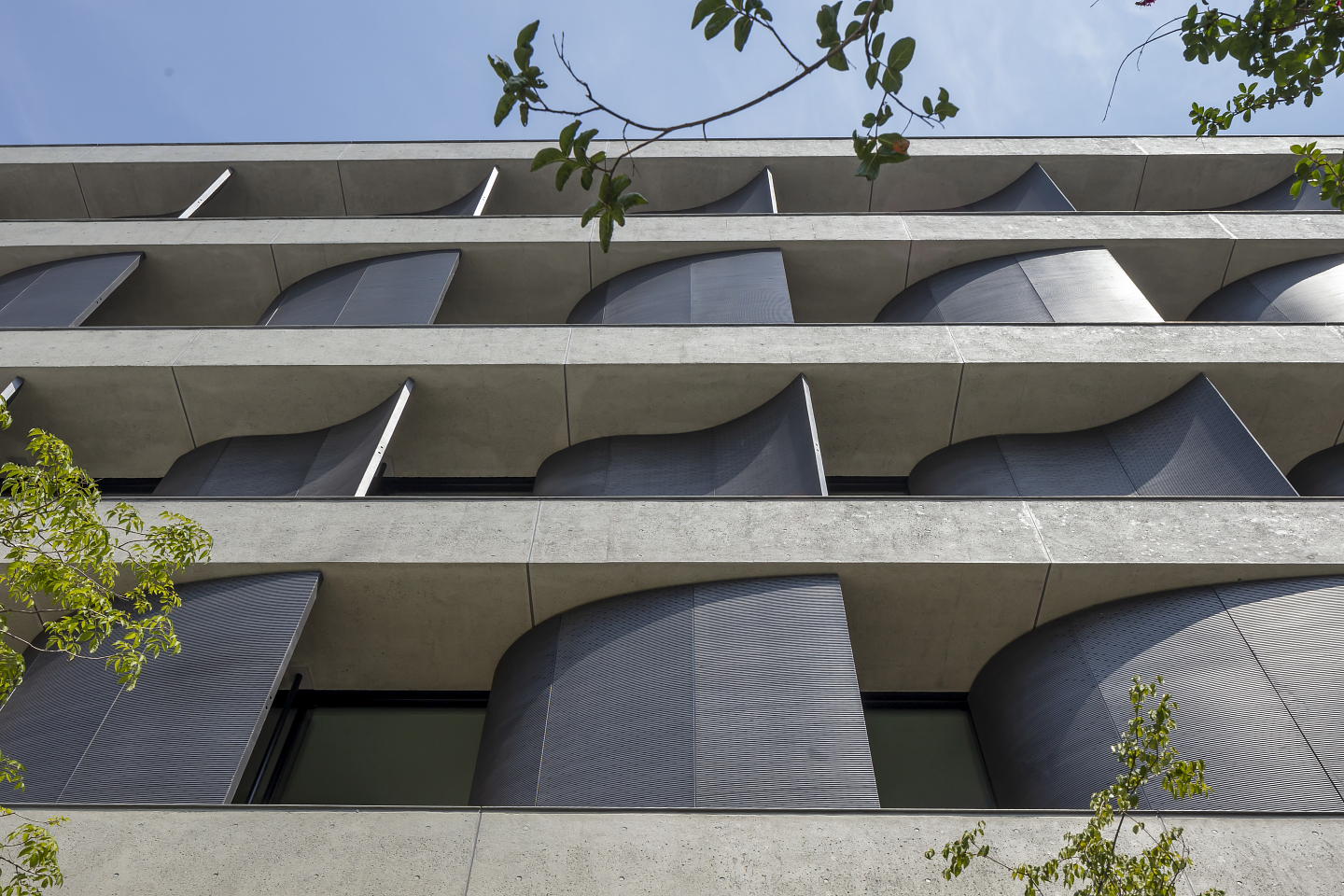
由于熊本市的年均降雨量超过2000毫米,建筑外部所有混凝土均经过喷砂处理,使其表面富有纹理,以避免留下明显的雨渍。遮光板和立柱采用带有凹凸的铝铸构件,通过保证板材的强度,在最大限度减少固定用五金件和基材的同时,确保了较高的耐候性。可从办公室中看到的屋檐采用了水刷石工艺,今后它沁入岁月斑驳的样子着实令人期待。
Heat and light were not the only concerns that factored into the building plan; Kumamoto City’s more than 2,000mm of average annual rainfall gave birth to the idea of sandblasting all concrete surfaces to afford a natural “textured” look that would prevent rain stains from standing out. The shading panels and pillars are also made of uneven cast aluminum to ensure panel strength and high weather resistance while minimizing the use of fastners and substrate. The eaves, which can be seen from the office, were installed with a washed-out finish, which will add texture to the building over time.
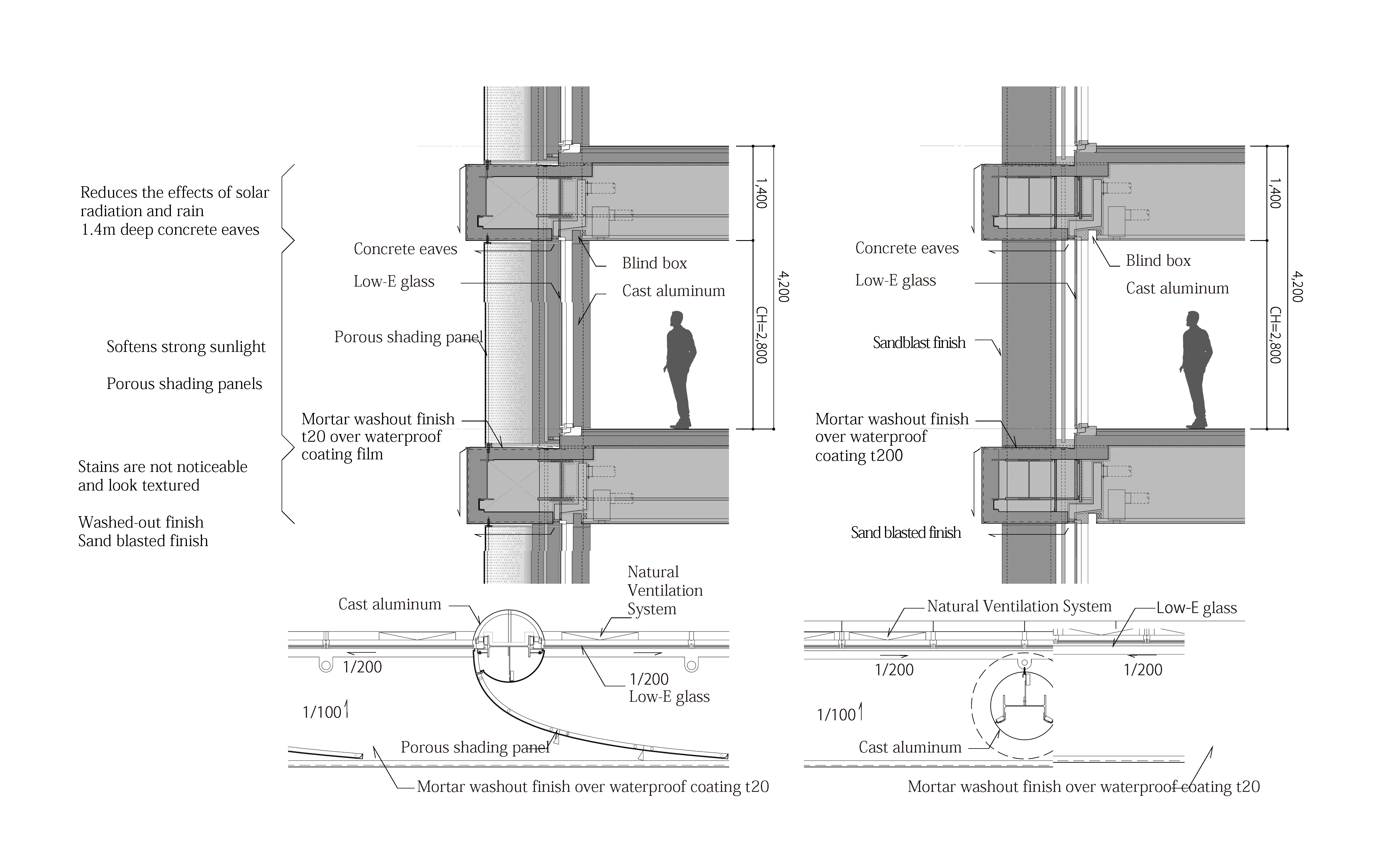
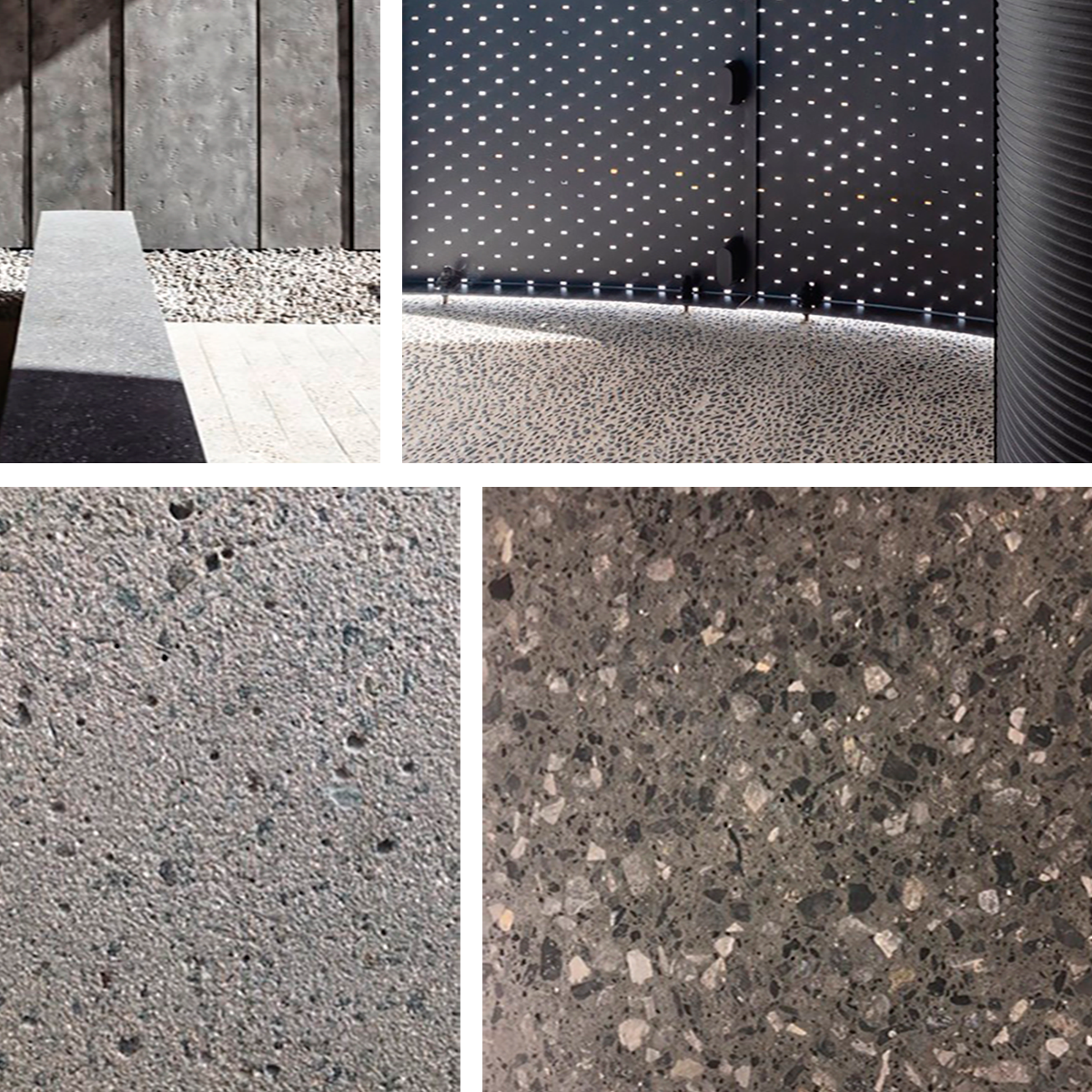
结合区域经济特点的空间设计
熊本市作为分支机构型经济城市(在全国范围内经营的公司,其分公司或子公司集中的城市),多以小型租户为主,但也有如客户服务中心等整层租赁的需求,这就需要高度灵活的物业空间规划。此大厦没有局限于通常的小面积与整层出租,而是通过采用仅需去除走廊的边界墙便能扩大可租赁面积的设备和防灾设计,实现了可提供更多样化租赁方式的办公楼。
Kumamoto City bustles with corporate branch offices, hosts many small-scale tenants, and also fields demand for rental of the entire floor by call centers and other businesses. Responding to this meant creating a highly flexible tenancy leasing plan. The building was designed to accomodate further tenancy area expansion by even allowing for the removal of corridor boundary walls. This allows for office space that can be leased in a variety of ways.
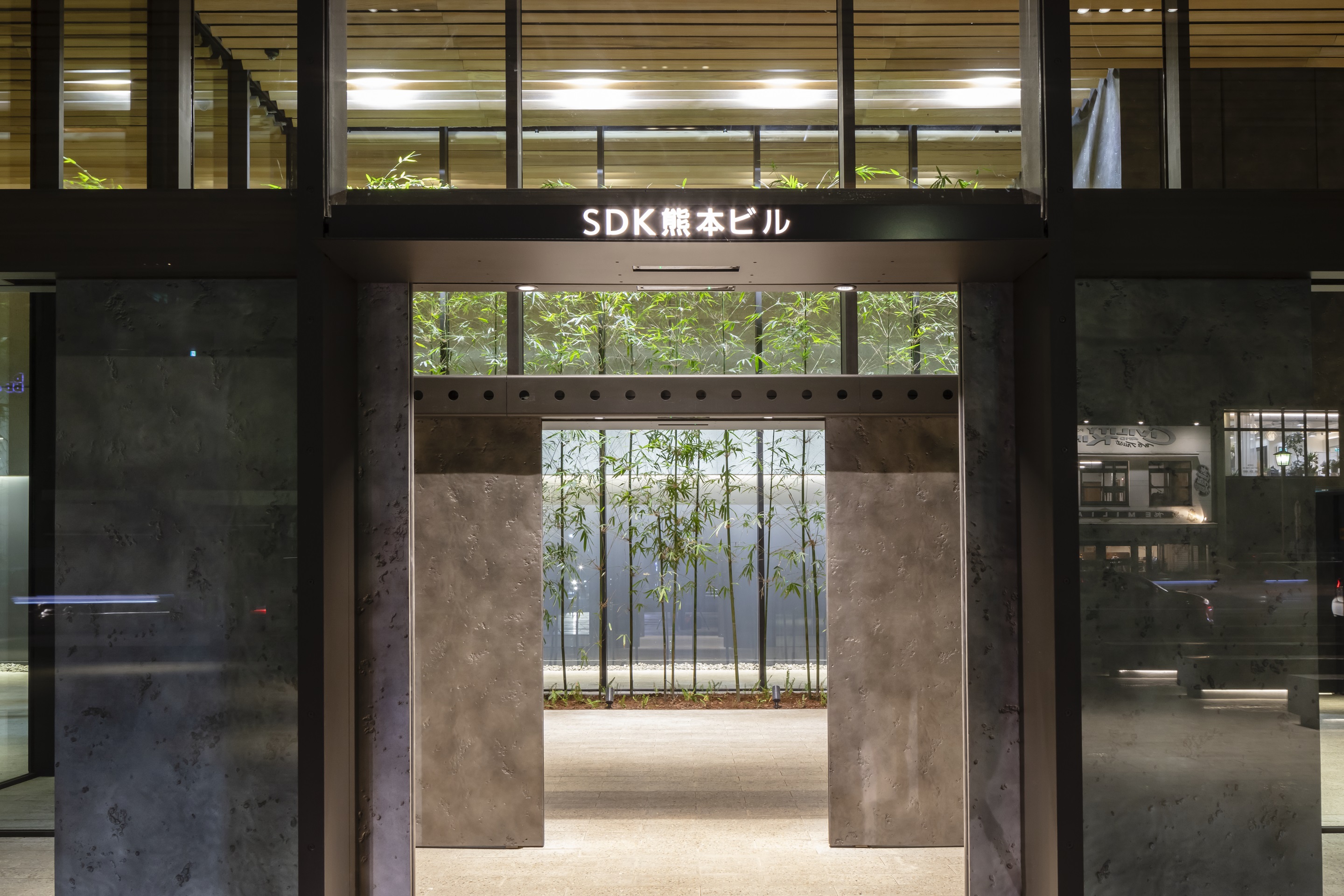
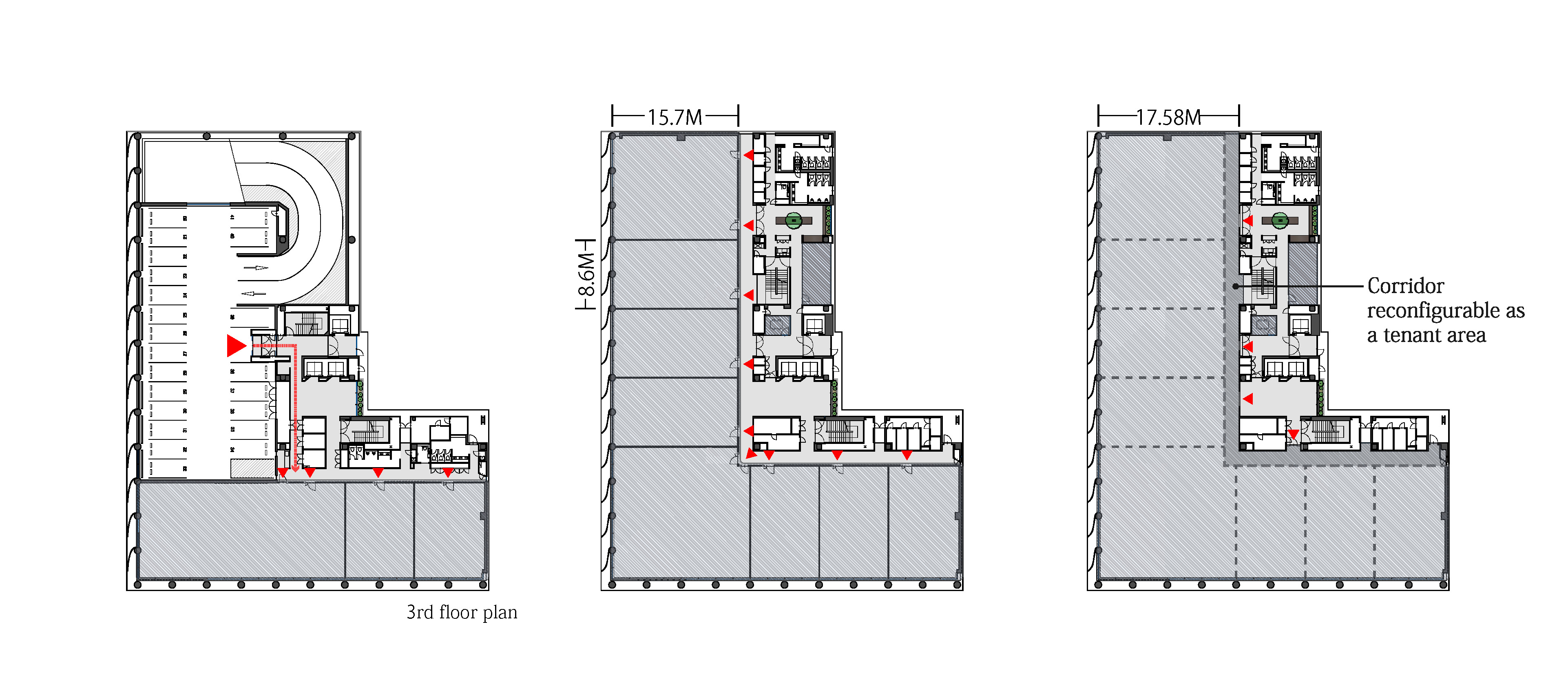
在停车场的设计上,我们充分考虑了熊本市作为“汽车社会”的地区需求。虽然日本的中型办公楼多采用塔式停车系统,但我们吸取2016年4月熊本地震期间汽车无法正常出入库的教训,配置了具有较高安全性的自走式停车场。停车场1层规划了一家租车店面,还采用了可直接驱车前往3层办公楼层的Drive in Office(免下车办公室)模式。
The parking lot plan reflects the local needs of car-centric Kumamoto City. In Japan, mechanically operated tower parking is the norm for medium-sized office buildings. But the 2016 Kumamoto earthquakes, which disabled vehicle retrieval out of such structures, forced a re-think. The result was the installation of a much safer conventional parking lot. A car rental business was also incorporated on the first floor, and the 3F office floor can be accessed directly as an innovative “drive-in office.”
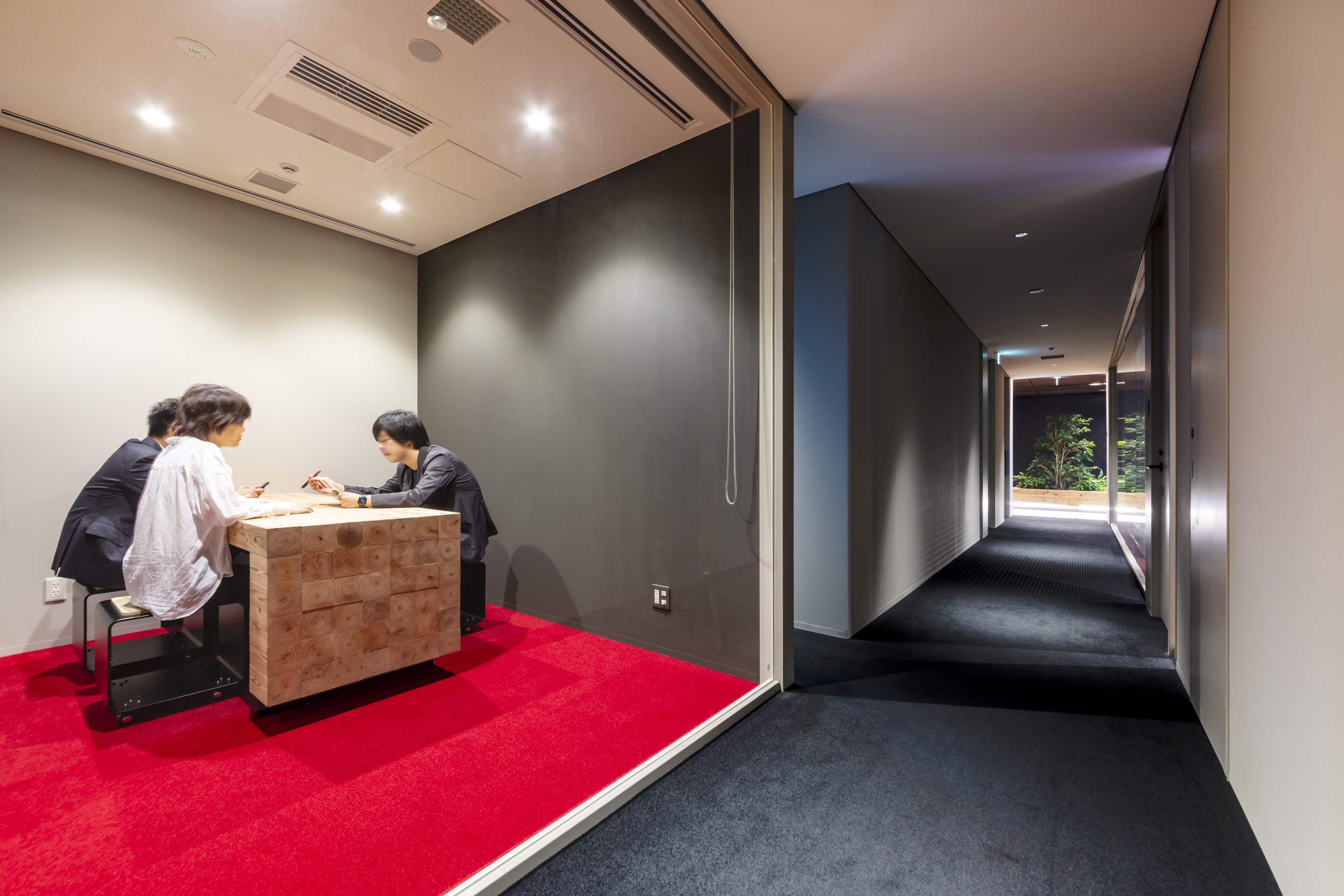
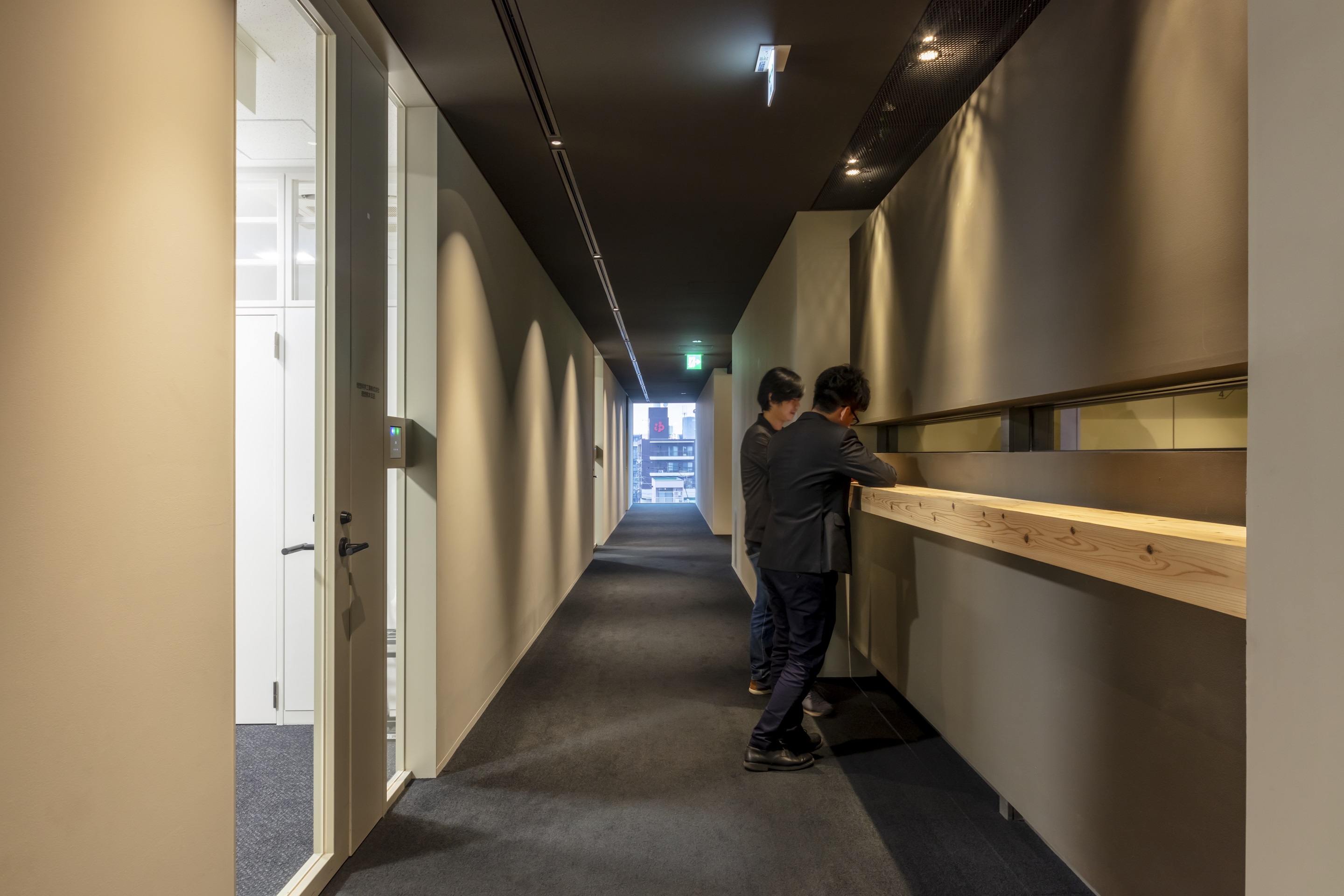
邂逅有趣体验
打造富有街区特色的公共区域
项目地块位于“上乃里”,一个多条小巷纵横交错的时尚街区。我们着眼于此,希望打造一个能于漫步间邂逅有趣体验的公共区域。结构设计上,我们像城中小巷一样,精细划分核心筒的各种用途,并在瞩目之处对外展示使用者们的活动。
The site’s location in the fashionable Kamino-Ura district, with its many alleys, provided the grist to create a common area for meandering and discovery. Various components of the building’s core that are typically placed together are intentionally dispersed, resulting in a structure akin to a town alleyway. The ground floor plaza at the end of Namikizaka-dori is the marquee area where all the activities there are on display.
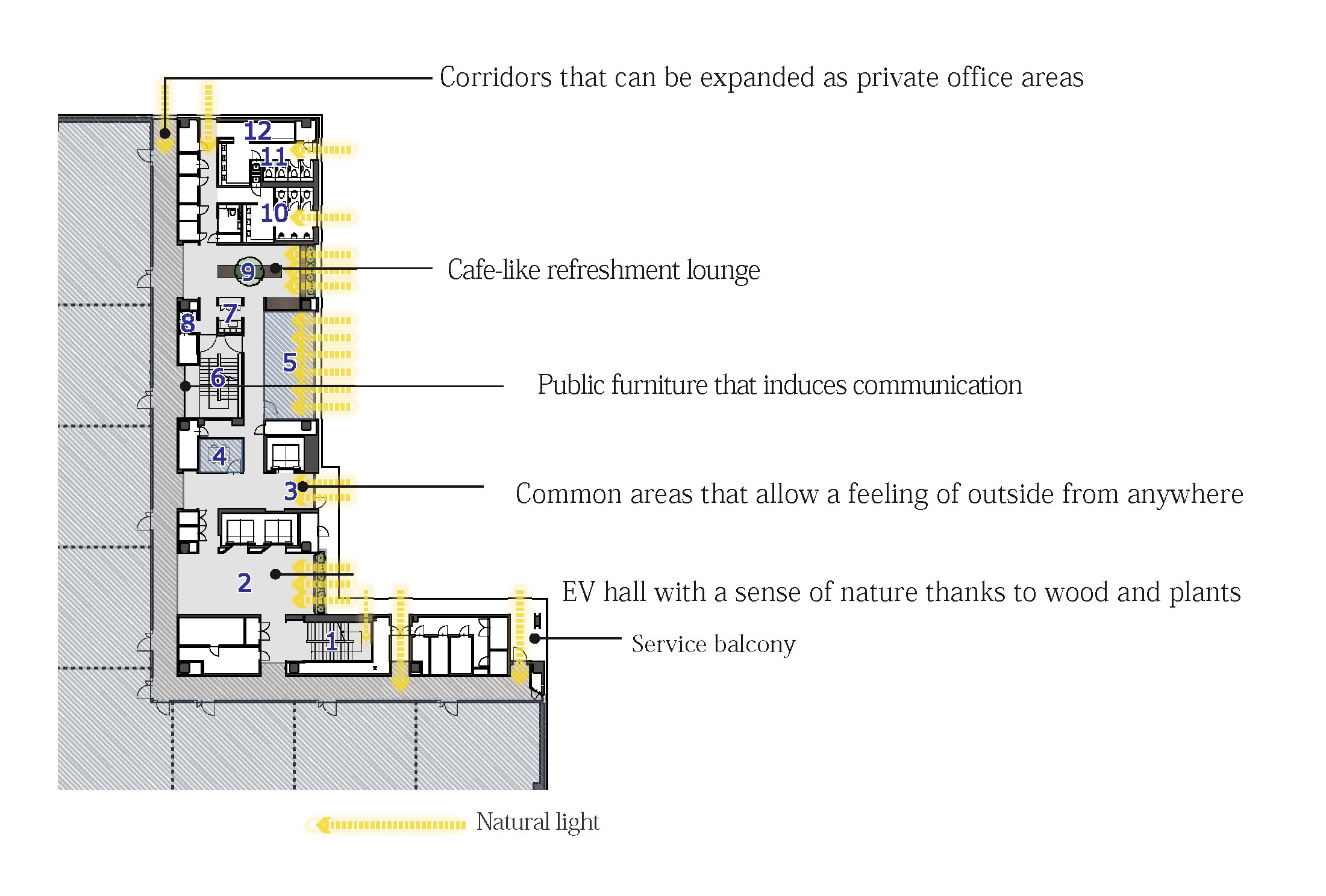
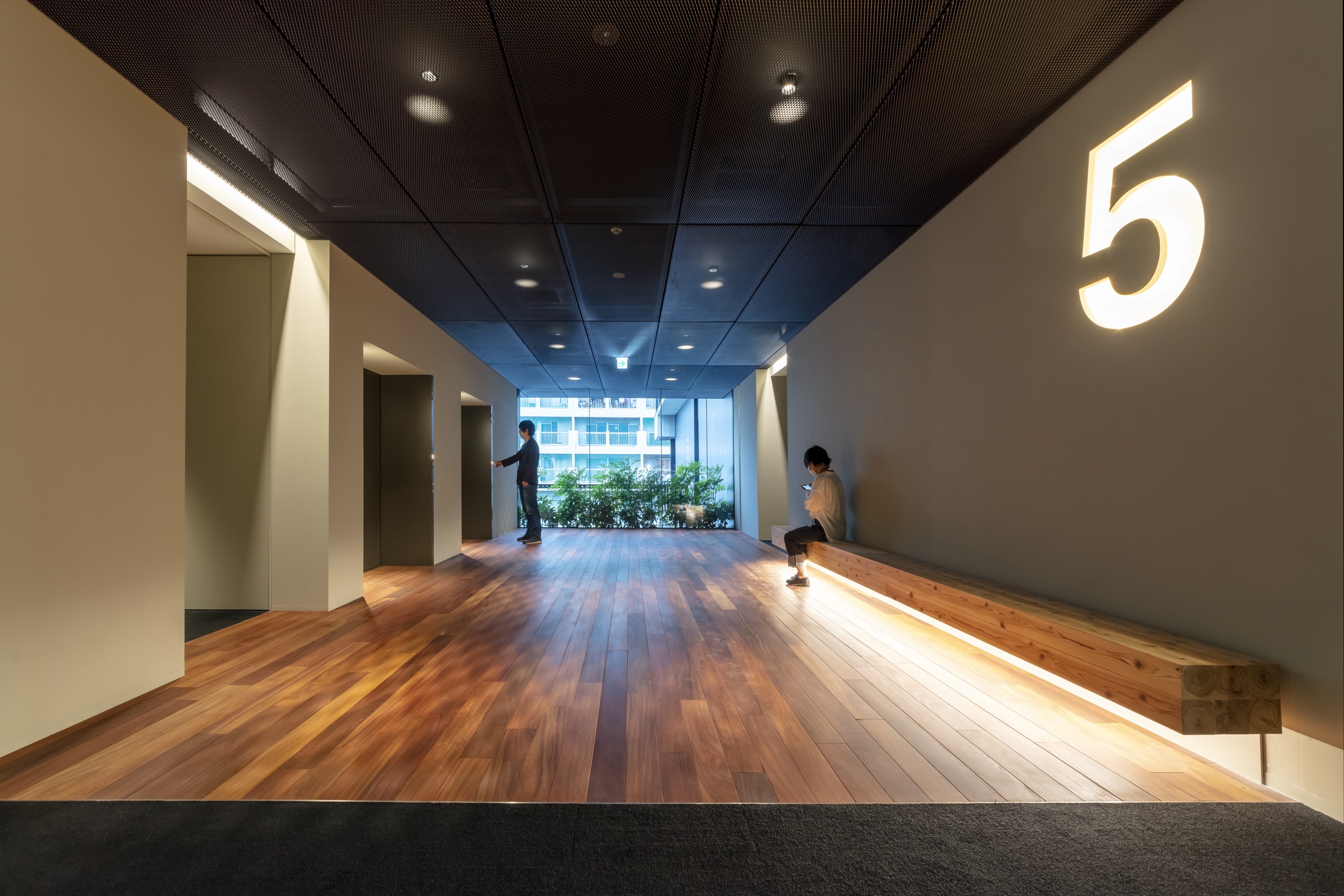
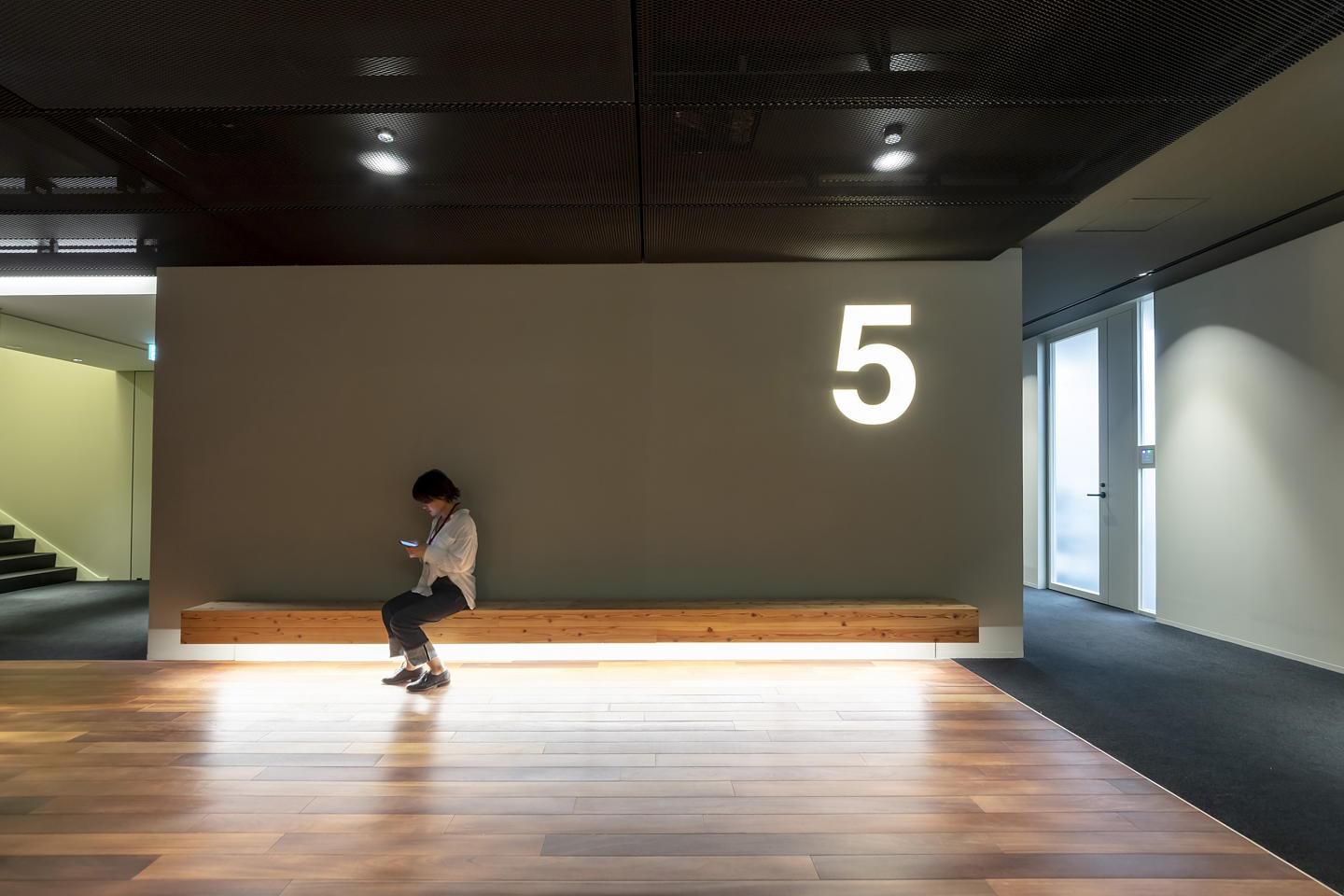
考虑到距离市中心较远区域的慢工作节奏,我们在此设计了可举办各种活动的公共空间。附有开放式厨房的休息区、走廊上的高吧台、免费会议室……希望通过提供充实的配套空间,以促生全新的工作方式。另外,所有的公共区域中均有引入自然光,并种植可令人感受四季变换的植物,营造一个更为贴近自然的办公环境。
In addition, in consideration of the slower work style due to distance from the city center, a common area space was installed to support a variety of activities. The approach here was to create new work styles by providing a full range of support spaces -- a refreshment corner with an open kitchen, high-counter equipped hallways, free meeting rooms, etc. Combined with natural lighting, seasonal plants and greenery, the effort yielded a more natural feeling office environment.

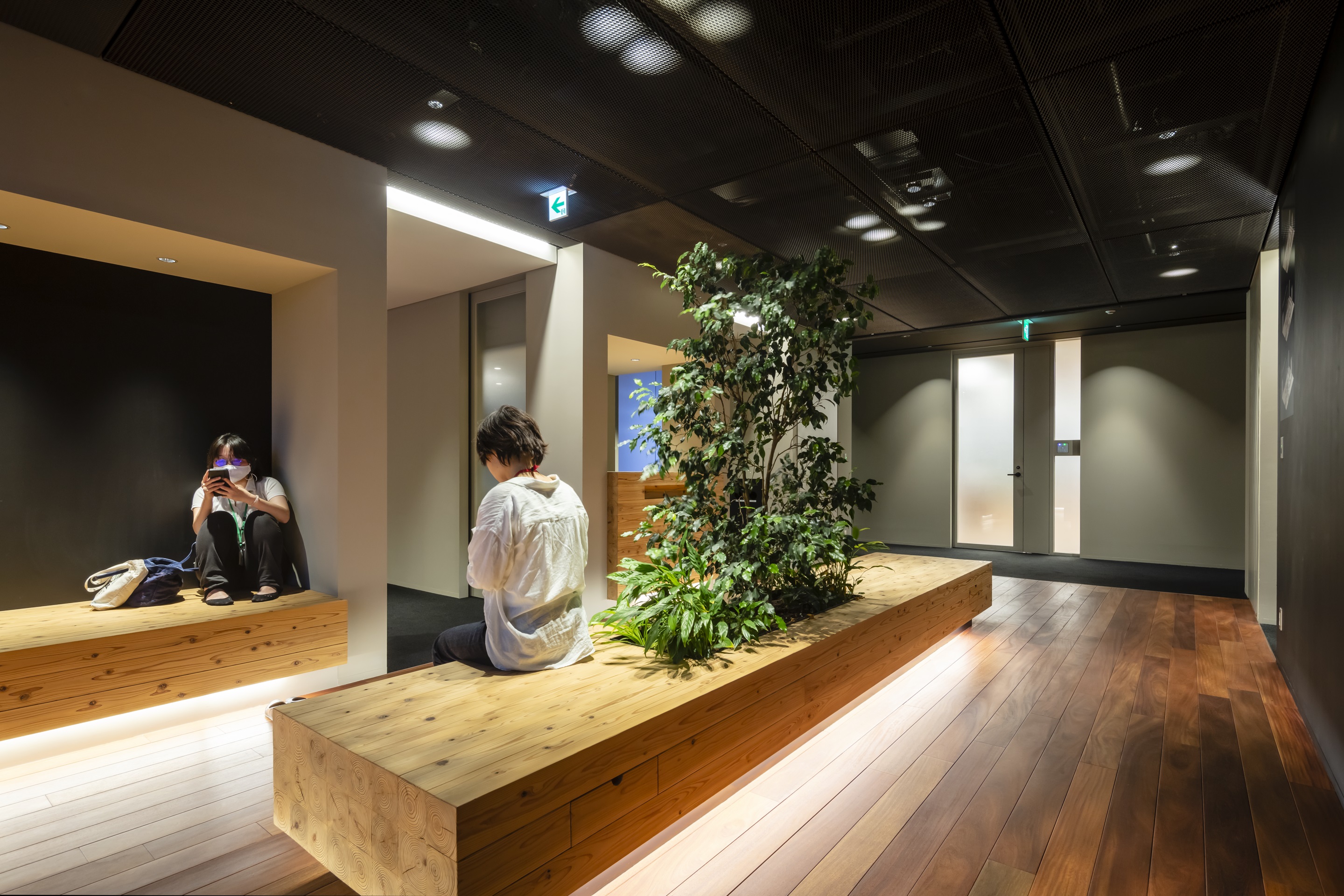
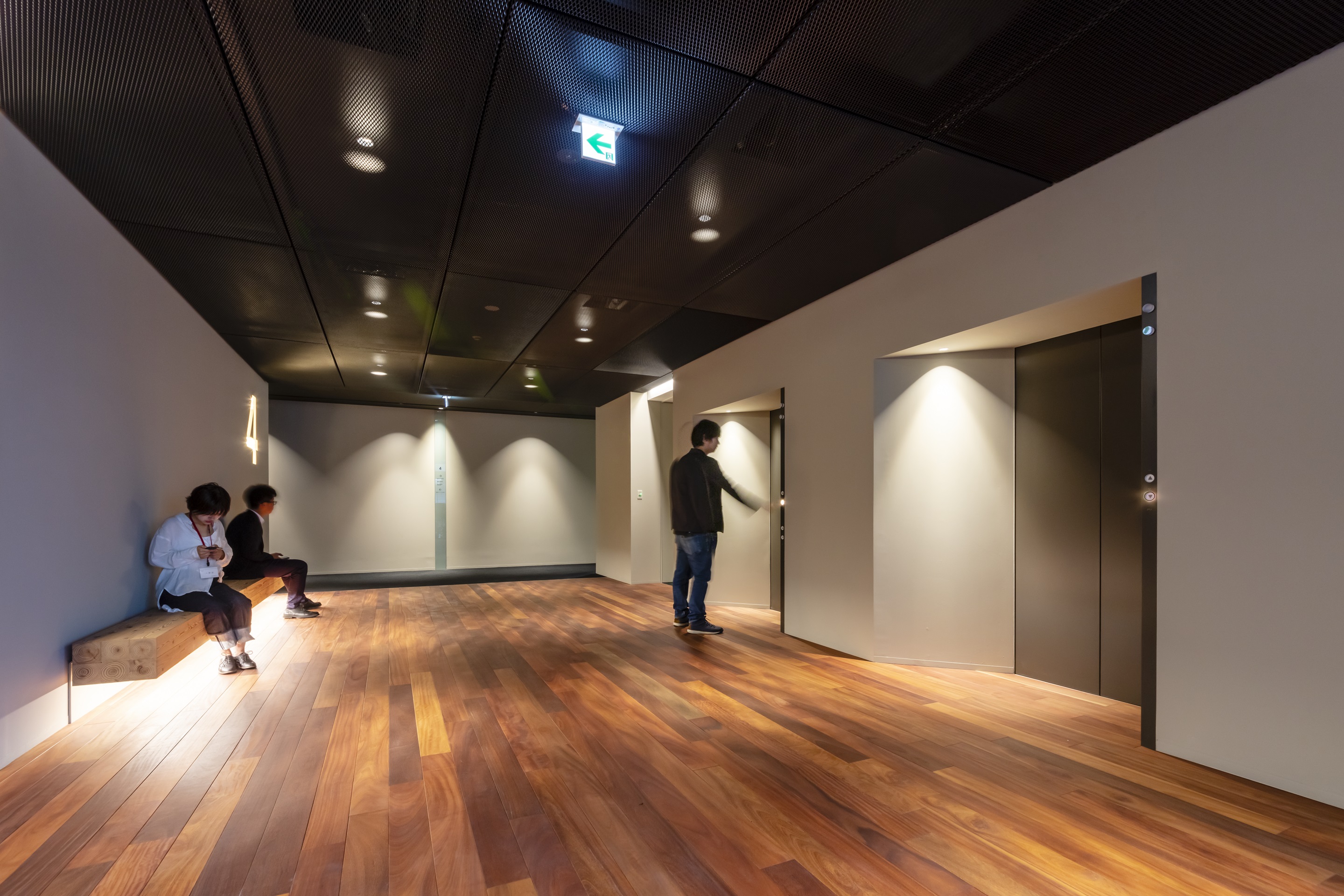
传承记忆
实现区域振兴
规划地块位于繁华的上通、并木坂,以及曾作为寺町(寺院集中的城市)的大气庄严的仁王大街交叉的节点处,此处作为熊本城的城下町(以城郭为中心成立的城市),自古以来就熙攘繁盛。基于这一特点,本项目以“时空的连结”为主题,力求在设计中呈现出地区历史与空间特点的连续性。
The project area has long prospered in the shadow of nearby Kumamoto Castle, as the site lies at the nexus of the busy Kamidori and Namikizaka streets, as well as Niou-san Street, a former stately temple area. The project’s theme, "Time & Space Connection," was based on these attributes, and aimed to portray continuity between the region’s history and its peculiar features.
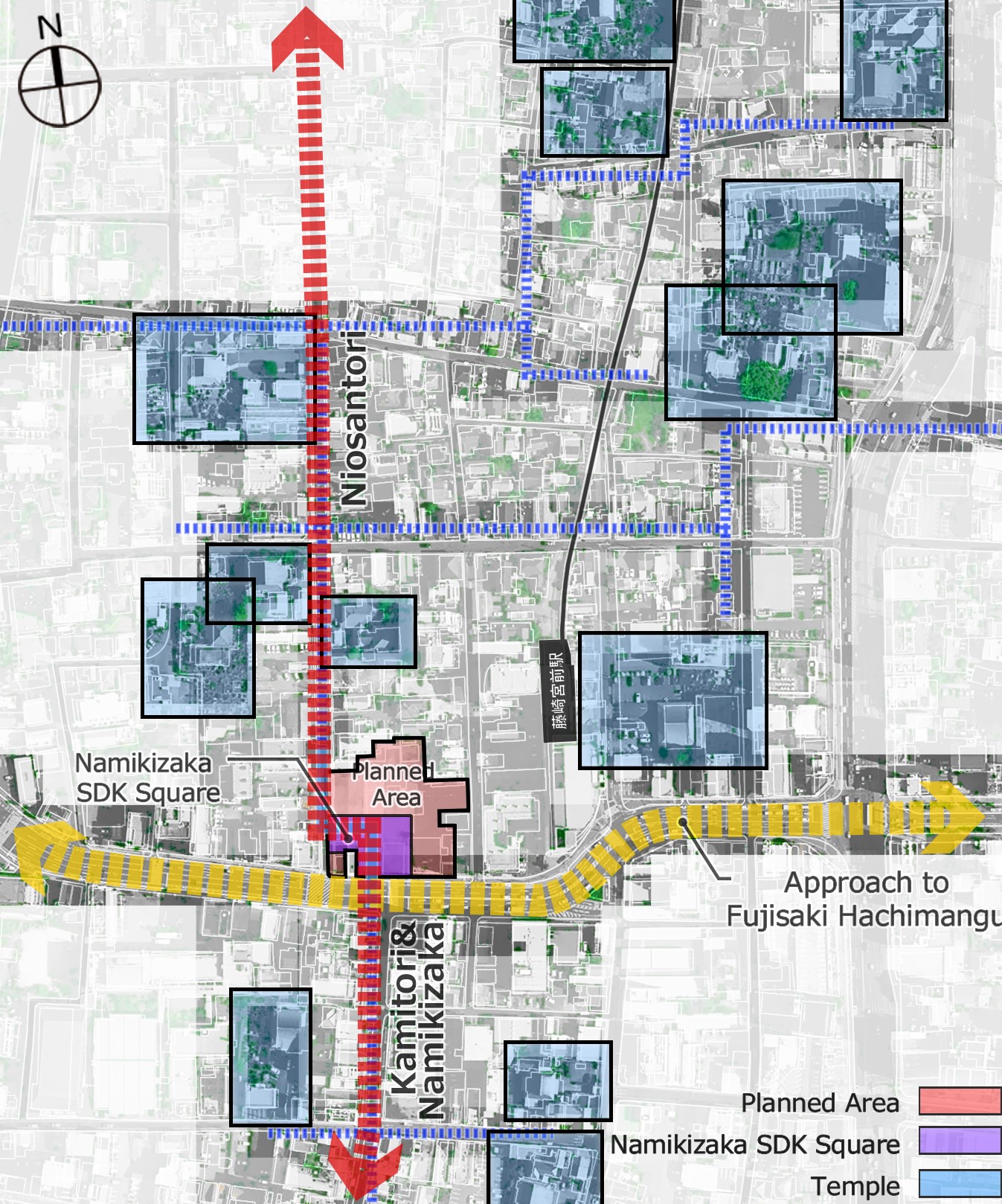
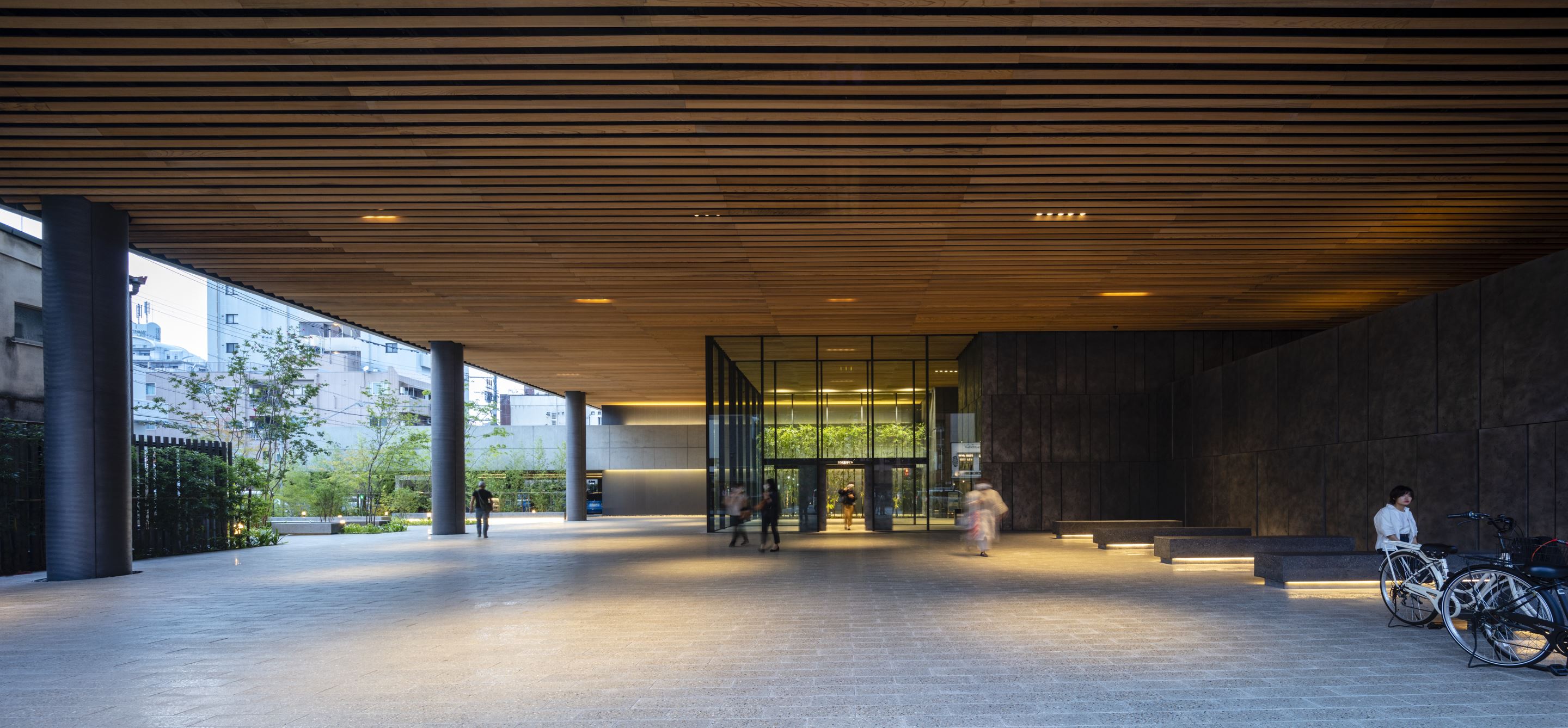
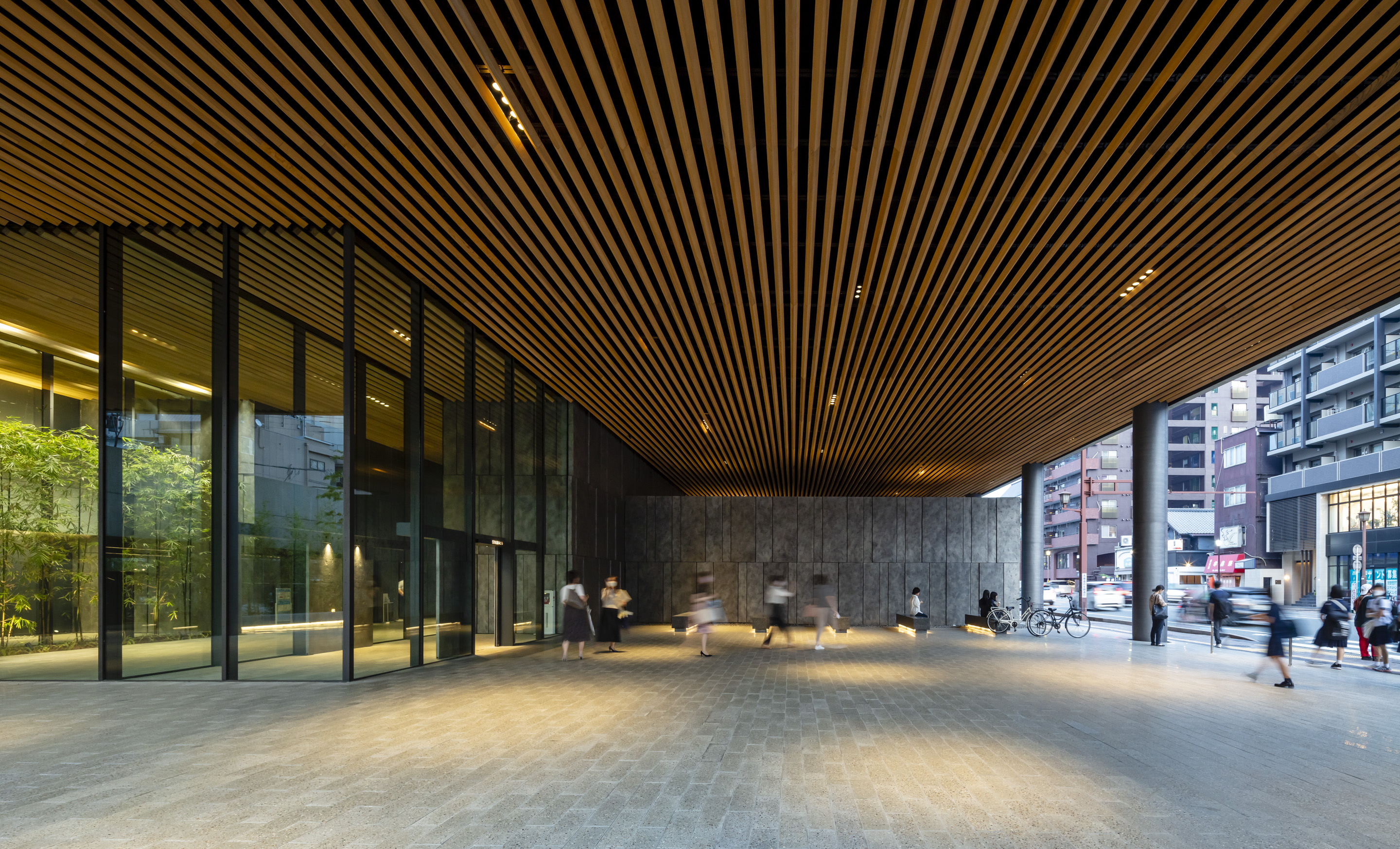

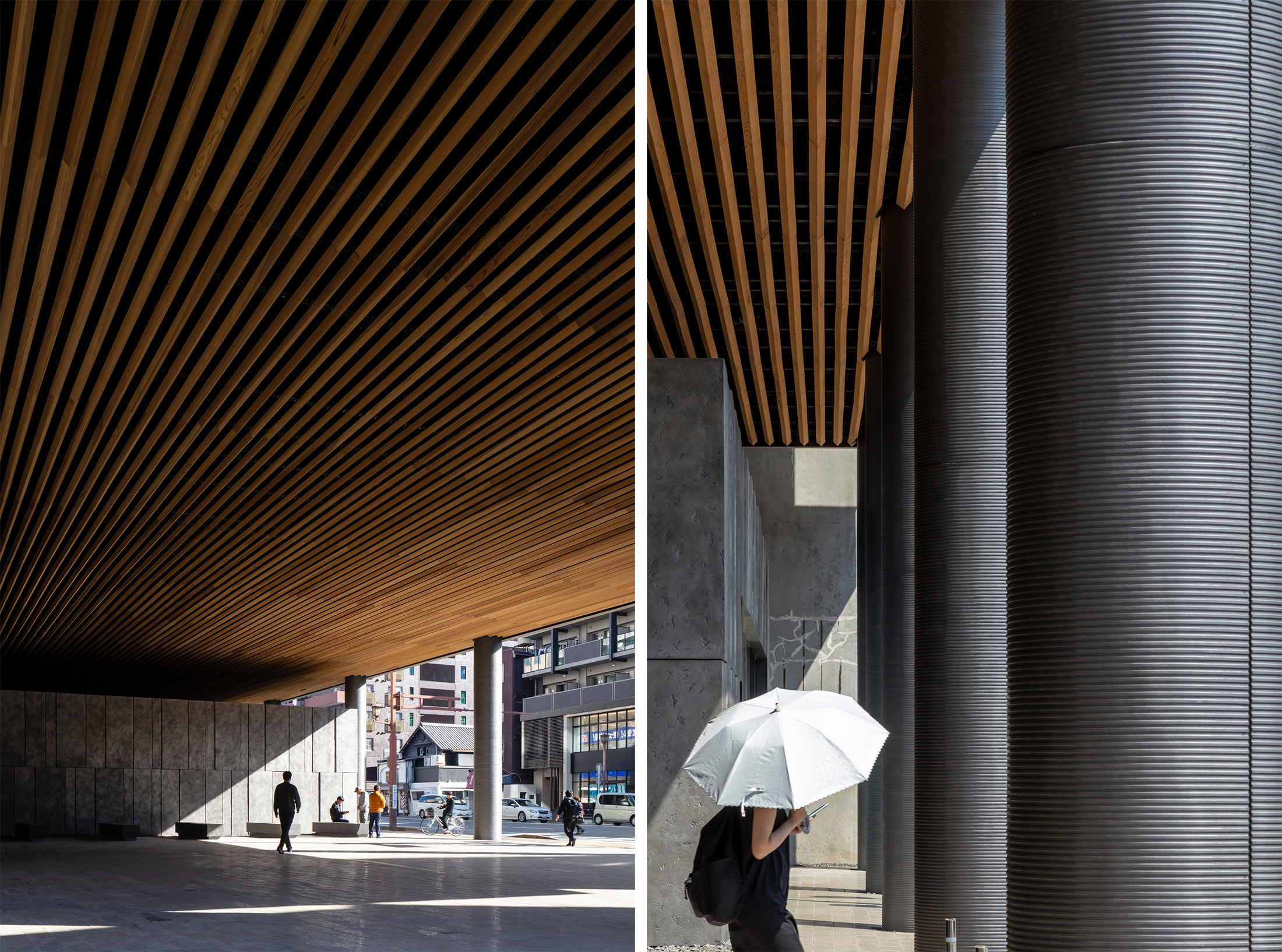
底层架空空间平时是连接并木坂和仁王大街的道路,举办活动时则是面向城市开放的舞台,成为创造活力的空间连结点。另一方面,建筑的外观设计以让人联想到瓦片的遮光板和椽子、柱廊等寺庙神社建筑元素,作为“时间的连结”,将寺町的历史荣光传递给后世。我们希望这座建筑能成为象征该地区特色的标识,并长久受到人们的喜爱。
The piloti space, which serves as a link between Namiki-zaka and Niou-san-dori, becomes a town-friendly stage and a hub for fun and excitement on event days. The building’s exterior design, with its shading panels reminiscent of roof tiles, rafters and colonnades in the temple/shrine architectural motif, is a temporal tie-in that imparts to posterity the feel of a traditional “teramachi” (a city block dense with temples and shrines). It is our fervent hope that this project gives ample highlight to the area’s admirable local features, and grows to be a beloved icon by all.
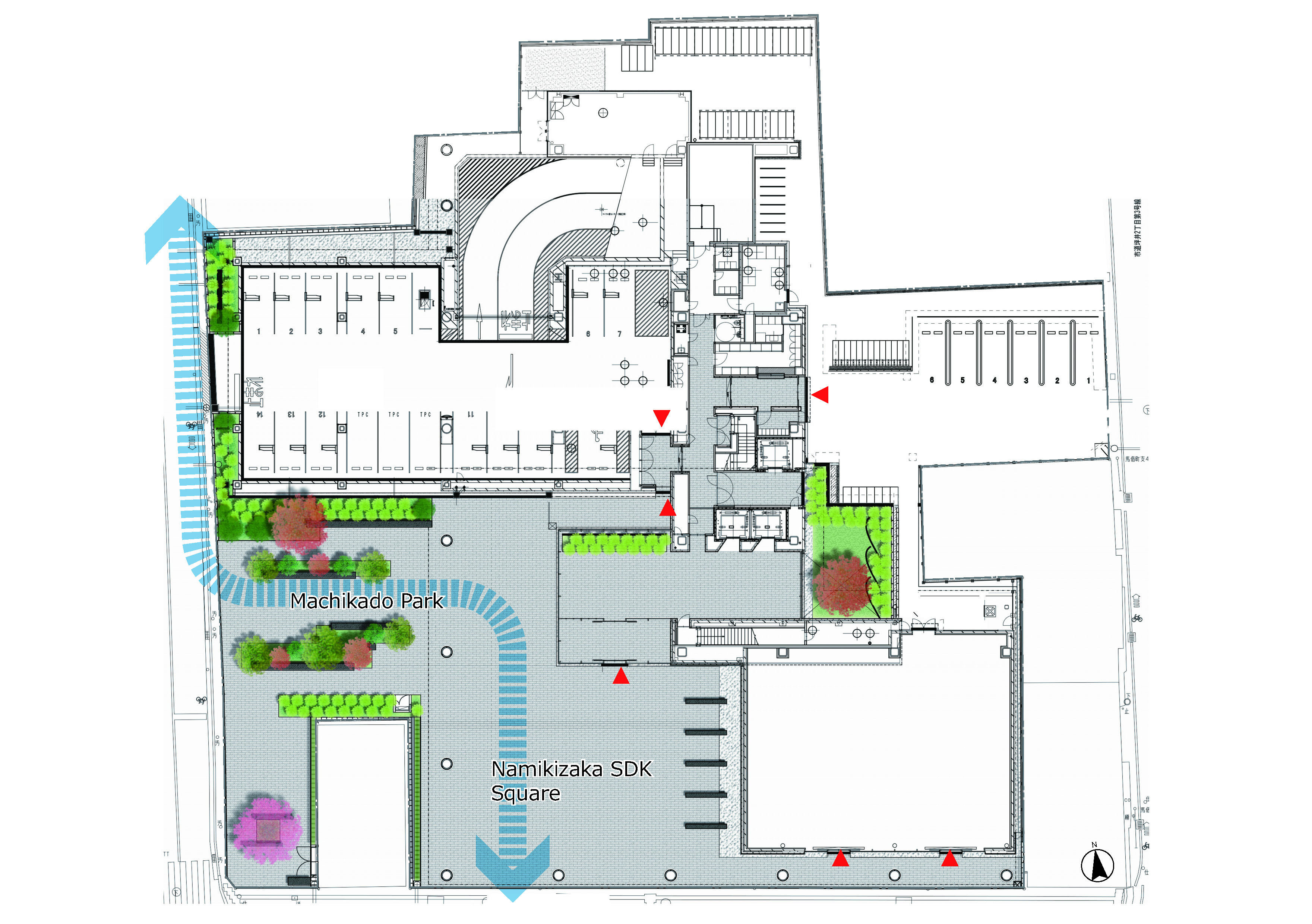
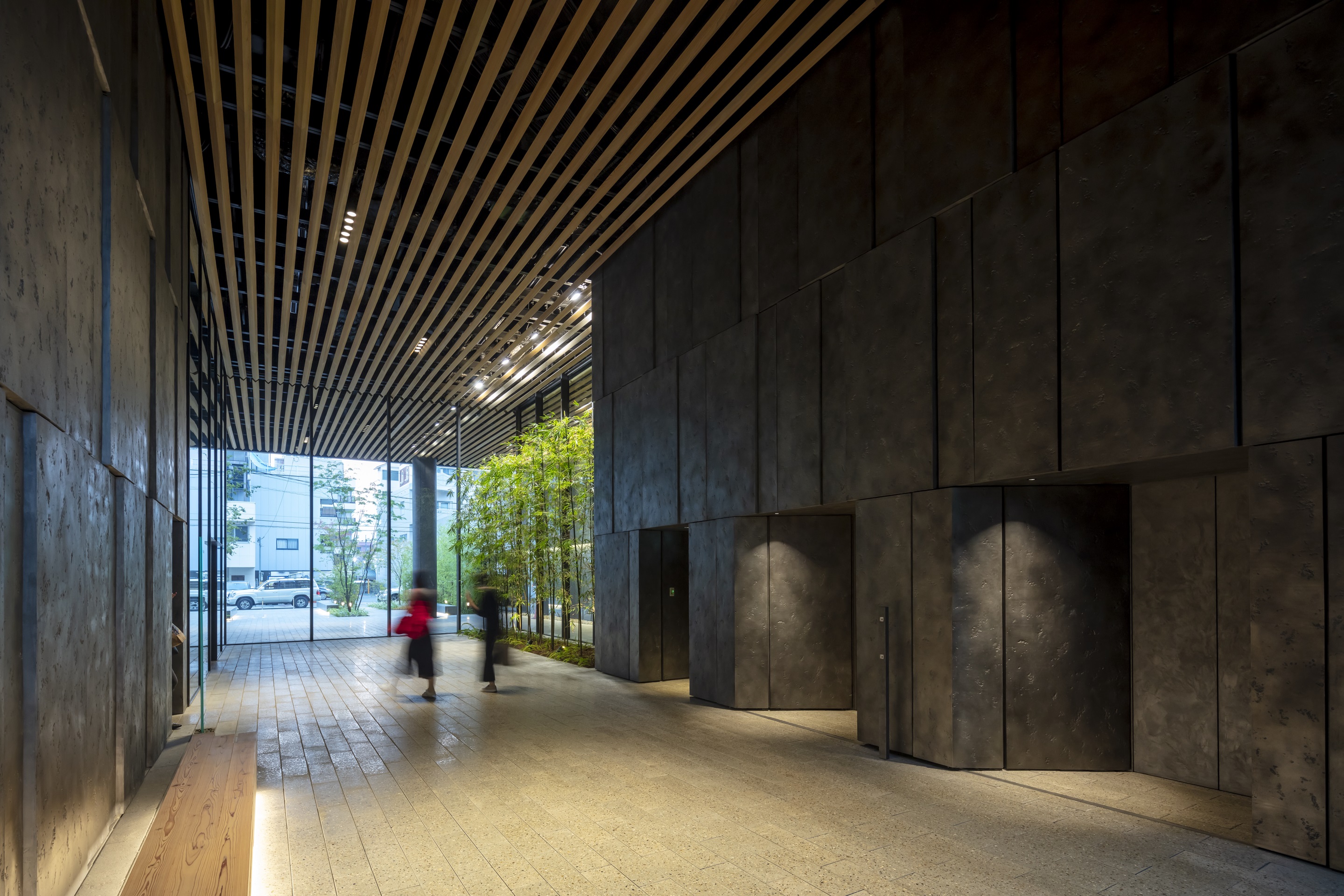
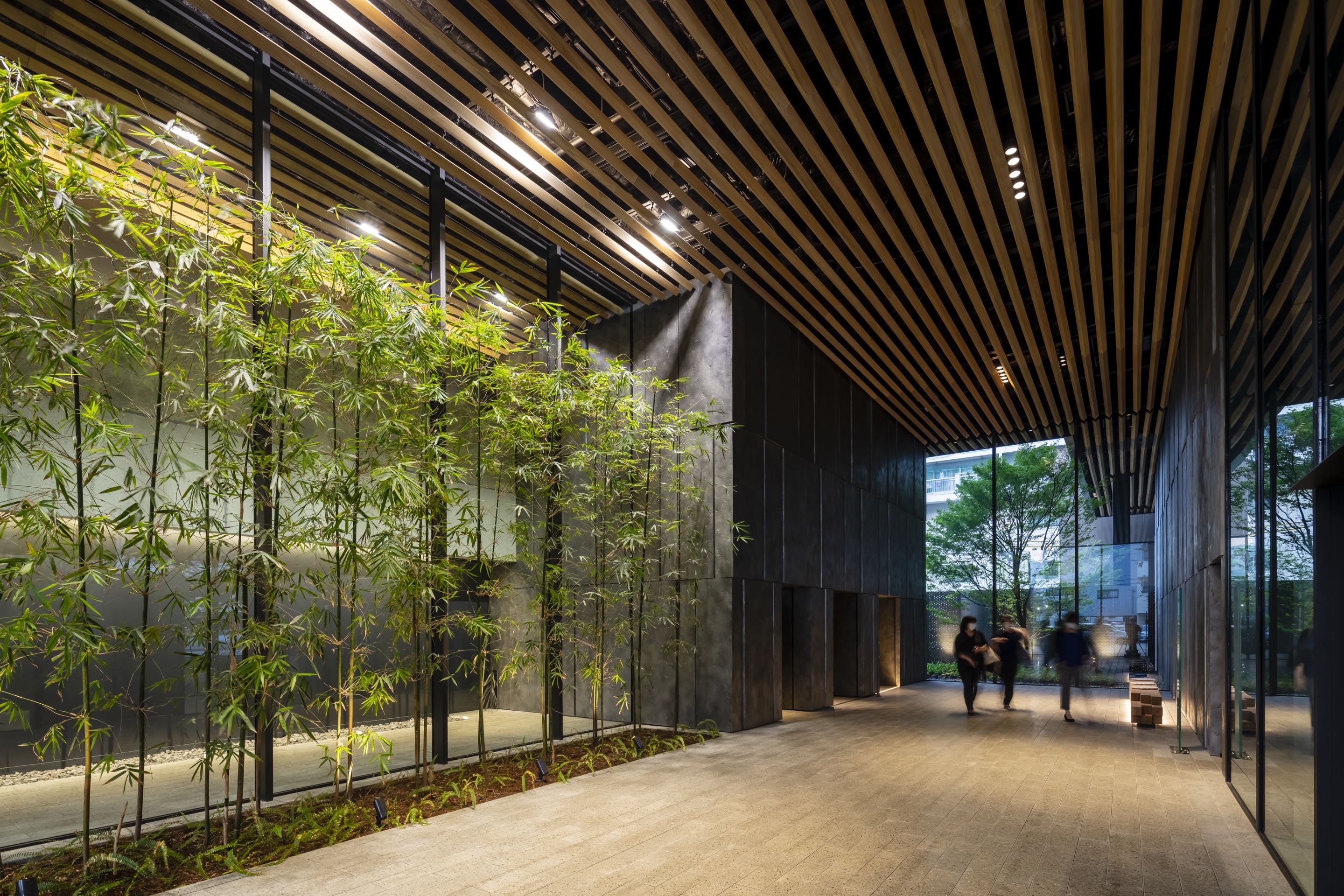
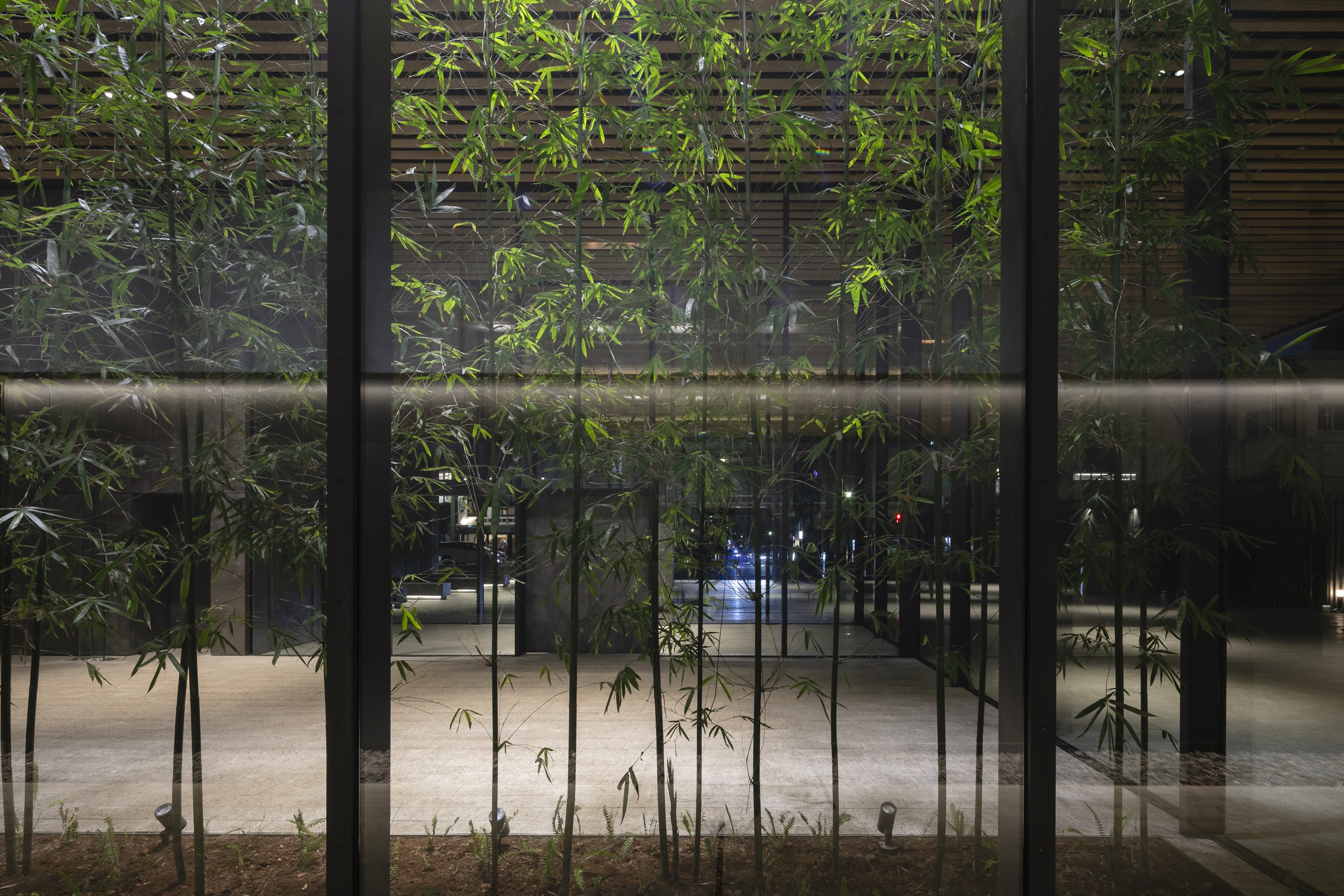


完整项目信息
项目业主:西部电气工业株式会社
项目位置:日本熊本市中央区
用地面积:3,303.46平方米
占地面积:2,247.42平方米
建筑面积:10,143.10平方米
建筑层数:地上6层
建筑结构:钢结构
建筑高度:29.08米
竣工日期:2019年
版权声明:本文由日建设计授权发布。欢迎转发,禁止以有方编辑版本转载。
投稿邮箱:media@archiposition.com
上一篇:同一主题下的多元释义:苏州“狮子口”遗址环境保护与扩建 / 上海日清建筑设计
下一篇:Marcel Meili在ETH的最后演讲:“现状” – 七个命题